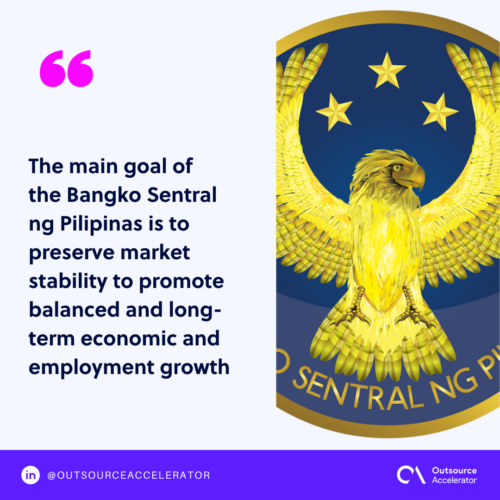Bangko Sentral ng Pilipinas
Definition
What is Bangko Sentral ng Pilipinas?
The Bangko Sentral ng Pilipinas (BSP), also known as the Philippines’ central bank, was established on July 3, 1993, in accordance with the 1987 Philippine Constitution and the 1993 New Central Bank Act.
The BSP succeeded the Central Bank of the Philippines and the legislation creates an autonomous monetary authority known as the Bangko Sentral ng Pilipinas, whose principal goal is to preserve price stability.
What is the purpose of Bangko Sentral ng Pilipinas?
The main goal of the Bangko Sentral ng Pilipinas is to preserve market stability to promote balanced and long-term economic and employment growth. It also strives to promote and maintain monetary stability and peso convertibility.
Furthermore, the central bank works with the National Government to preserve financial stability. To achieve its goals, the BSP must encourage broad and convenient access to high-quality financial services while also taking the general public’s interests into account.

What are the roles and functions of Bangko Sentral ng Pilipinas?
The Bangko Sentral ng Pilipinas performs the following functions under the New Central Bank Act of 1993, which relate to its status as the central monetary authority of the Republic of the Philippines.
Here are some of the roles of the BSP since it replaced the Central Bank of the Philippines, including:
Monetary operations
Monetary activities include the purchase and sale of government securities, the lending or borrowing of primary assets as collateral, the acceptance of fixed-term deposits, foreign currency swaps, and the use of other monetary instruments issued by the Bangko Sentral ng Pilipinas.
It was conducted to affect the underlying demand and supply circumstances for central bank money.
Financial supervision
According to the New Central Bank Act, the Bangko Sentral has responsibility for the activities of banks and non-bank financial entities exercising substantially banking duties.
Payments and settlements system oversight
Payment systems are crucial to the efficient operation of global financial systems. They offer the tool for transferring funds between banks and other organizations across the economy.
When a payment system is efficient, secure, and dependable, the cost of exchanging goods and services is lowered.
The payment and settlements system is a critical instrument for the successful execution of monetary policy, as well as the smooth operation of the economy and its financial and monetary systems.
Currency management
The national currency issued by the Bangko Sentral ng Pilipinas has the ability and right to do so. Notes and coins in the Philippines are issued in amounts that don’t exceed the assets of the Bangko Sentral ng Pilipinas.
Inclusive finance
The Bangko Sentral ng Pilipinas oversees several initiatives and policies designed to improve financial education and consumer empowerment, as part of its responsibility to encourage easy access to high-quality finance and accounting services.
International reserves management
It maintains a strong amount of foreign reserves to offer financial liquidity assistance in times of exchange rate and balance of payments inconsistency.
International operations
The international operations directives of the Bangko Sentral ng Pilipinas from the international operations department help to promote and maintain price stability.
The BSP is also responsible for promoting the external sustainability, integrity, and value of the Philippine peso through overseas investments and other foreign exchange activities.
Economic education
Through its economic education site, the Philippine central bank provides the general public with supervised access to its collection of information.
The economic education webpage was created to help people better understand and appreciate the work of the Philippines’ central bank.
The portal also aims to increase and broaden the public’s grasp of economic concepts, allowing them to make better economic and financial decisions.







 Independent
Independent




